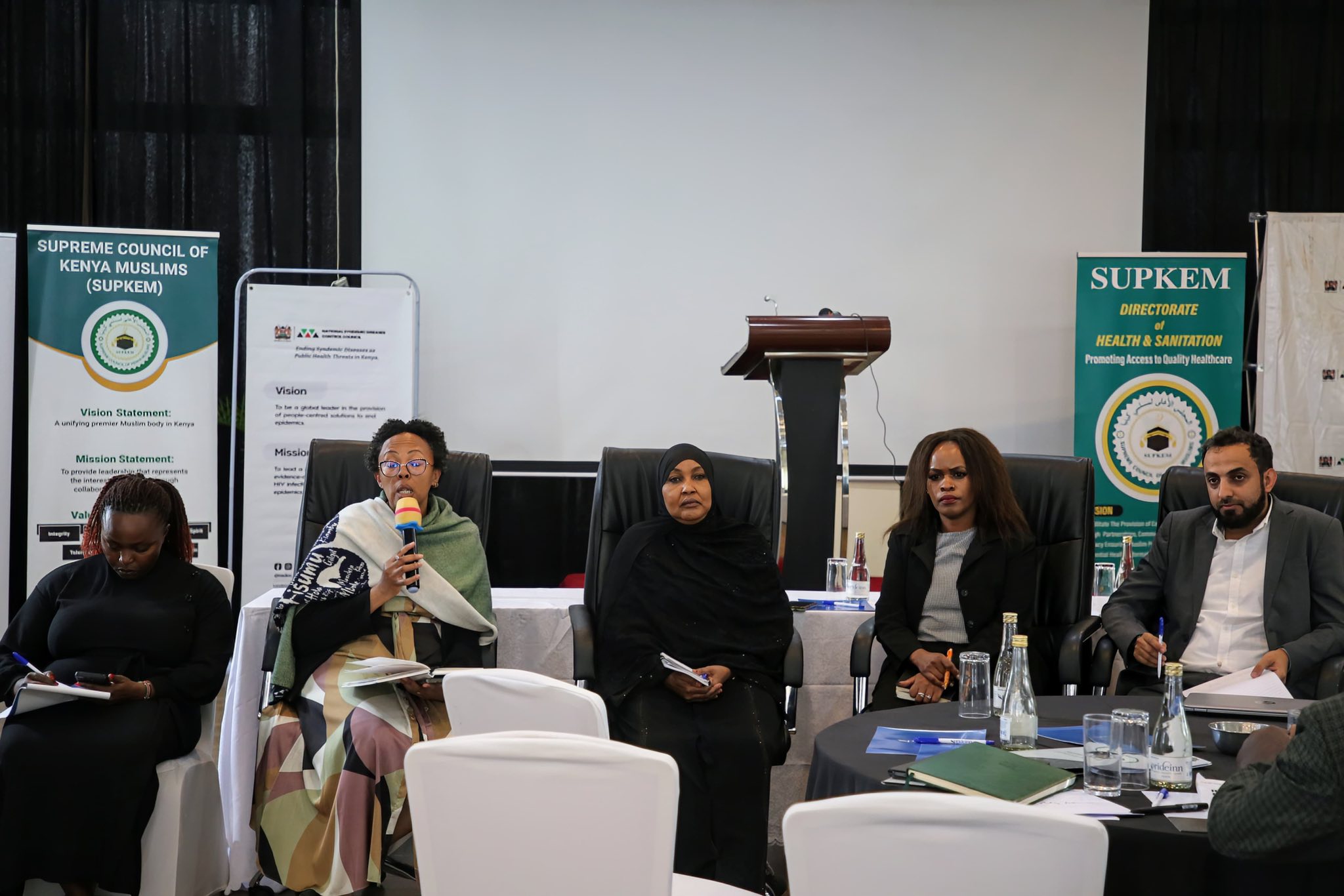Leaders at the high-level consultative meeting held Tuesday in Nairobi, organised by the Supreme Council of Kenya Muslims (Supkem), the National Syndemic Diseases Control Council (NSDCC), and other stakeholders.
Faith leaders are
key players in Kenya’s battle against HIV, stigma and improving
health-seeking behavior,
according to discussions at an ongoing meeting.
The high-level
consultative meeting was held
Tuesday in Nairobi, where the Supreme Council of Kenya Muslims (Supkem), the National
Syndemic Diseases Control Council (NSDCC), and other stakeholders joined forces to
chart a faith-integrated path for public health action.
The meeting
underscored the growing consensus that religious institutions are not merely
spiritual sanctuaries but potent platforms for social transformation.
This is particularly
in addressing sensitive health issues such as HIV, gender-based violence, and
mental health.
“When religious leaders speak, people listen,” said Angella Langat, director of partnership planning and resource mobilisation at the NSDCC. “This influence, when harnessed for public
health, becomes a powerful force in promoting awareness, encouraging testing,
and eliminating stigma.”
The meeting, organised
by the NSDCC, highlighted how strategic partnerships with faith-based organisations are not only vital in
public health education but also crucial in combating stigma associated with
HIV.
For instance, although HIV
prevalence in northeastern counties is lowest in Kenya, these counties have the highest stigma levels,
according to the recent National HIV and Aids Stigma and Discrimination Index.
The two-day forum
brought together medical professionals, government representatives, religious
leaders, and NGOs.
The meeting noted that
ending the HIV epidemic in Kenya requires more than medicine.
Langat pointed to the Kenya Aids
Strategic Framework II, a guiding document in the fight against HIV, where Supkem has been a consistent
and influential voice.
“Through the faith sector technical
working group, Supkem has helped craft culturally attuned health messages,
reaching congregations in mosques, madrassas, and other community forums.”
She called for deeper integration of religious perspectives into national
strategies, especially in hard-to-reach areas. “In ASAL counties, where new HIV
infections and mother-to-child transmission remain high, the voices of imams
and other religious leaders are essential in correcting misconceptions and
encouraging treatment,” she said.
Dr Valeria Makory, programme manager at the Ministry of
Health’s directorate of
health financing, expanded on how
the evolving health policy landscape can benefit from faith sector
collaboration.
She recalled working alongside Supkem during the amendment of the Social
Health Insurance Act, highlighting the importance of public participation.
“The future of Universal Health Coverage (UHC) depends on cultural
alignment,” said Dr. Makory. “Religious institutions are trusted spaces. We’re
now seeing the integration of chaplaincy programmes in healthcare settings, a recognition that healing
goes beyond clinical care.”
She also acknowledged that health is devolved, reinforcing the need to
include Imams in local
health facility committees and community health strategies.
“These leaders can help translate complex health policies into actionable
community behavior,” she noted, pointing out mental health and gender-sensitive
care as areas where faith actors can make a significant difference.
Dr Abdallah Bajaber, secretary
general of the Kenya
Association of Muslim Medical Professionals (KAMMP), grounded the discussion in
practical realities.
Dr Bajaber spoke of a health sector deeply entwined with Islamic principles
of care and community service.
“We are not new to this work. Our members serve in hospitals across the
country, run medical camps, and influence health policy,” he said. KAMMP, he
revealed, is planning to establish a Level 6B Sharia-compliant hospital, an initiative that merges faith,
culture, and clinical excellence.
Dr Bajaber also echoed calls for structured chaplaincy services in public
hospitals, noting past engagements with Kenyatta National Hospital and others to train
Muslim chaplains.
“It is time to institutionalise
spiritual care as part of holistic healing. When a patient sees their faith
reflected in care delivery, it builds trust and improves outcomes.”
Khatra Ali, the director
of health at the
Council of Governors, emphasised the urgent need for self-reliant digital
platforms. She noted that disruptions following the withdrawal of donor-funded
systems highlighted the importance of building local capacity for health data
management and continuity of services.
NSDCC said by
actively involving faith leaders, it is not only enhancing service delivery but also fostering an
environment where HIV is understood, treated, and ultimately destigmatised.
Langat said: “Ending
HIV is not just a medical mission, it’s a moral one. And with the faith sector as a cornerstone of
our efforts, we are closer than ever to realising that goal.”


